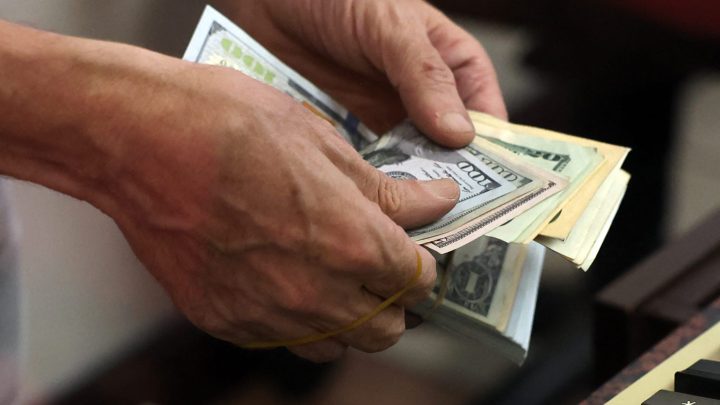
The dollar’s falling back to Earth as other countries raise their own interest rates
The dollar’s falling back to Earth as other countries raise their own interest rates

Recently, Marketplace has been delving into government bonds and rising yields.
Now, rising interest rates normally boost the value of the home currency. About a year ago, as the Federal Reserve was hiking U.S. rates aggressively, a lot of big, multinational companies were complaining that the dollar was too strong — so strong it was putting a dent in their overseas profits.
But this year, we haven’t heard many of those complaints. That’s because the dollar’s been weakening, even though interest rates are still high. Right now, the Fed isn’t the only central bank that’s raising them.
“The rest of the world has started to play catch-up and try to keep up with the Fed,” said Juan Perez, director of trading at Monex USA.
The European Central Bank has been raising rates, which has pushed up the value of the euro. Same with the Bank of England and the pound. The Mexican peso has been rising too, Perez said, largely because “Mexico is an economy that has a gross domestic product growing above 3%.”
A weaker U.S. dollar could help out any company that exports, since it makes those products cheaper. It makes services cheaper too, noted Kenneth Rogoff, an economics professor at Harvard.
“If you’re a music performer, and you’re doing a tour in Europe, and you charge in dollars, you’re going to be more competitive,” he said.
U.S. importers, on the other hand, might have to pay more for the products they bring in. That can make them hold off on buying.
“We haven’t purchased as much equipment,” said Greg Warwick, CEO of the equipment supplier TMB Baking, which imports items from Europe.
Warwick said he’s not concerned, partially because he bought a lot of equipment back in September, when the euro was cheap.
“So we feel comfortable with the inventory that we have of items like spiral mixers and some of those types of items where we purchased forward considerably,” he said.
Even though the dollar’s value has been weakening, it’s also becoming more stable.
“Large fluctuations in currency don’t really benefit anybody because it makes it harder to do business,” said Meagan Schoenberger, a senior economist with KPMG.
A more stable dollar helps importers, exporters and companies that do both, Schoenberger added.
There’s a lot happening in the world. Through it all, Marketplace is here for you.
You rely on Marketplace to break down the world’s events and tell you how it affects you in a fact-based, approachable way. We rely on your financial support to keep making that possible.
Your donation today powers the independent journalism that you rely on. For just $5/month, you can help sustain Marketplace so we can keep reporting on the things that matter to you.











